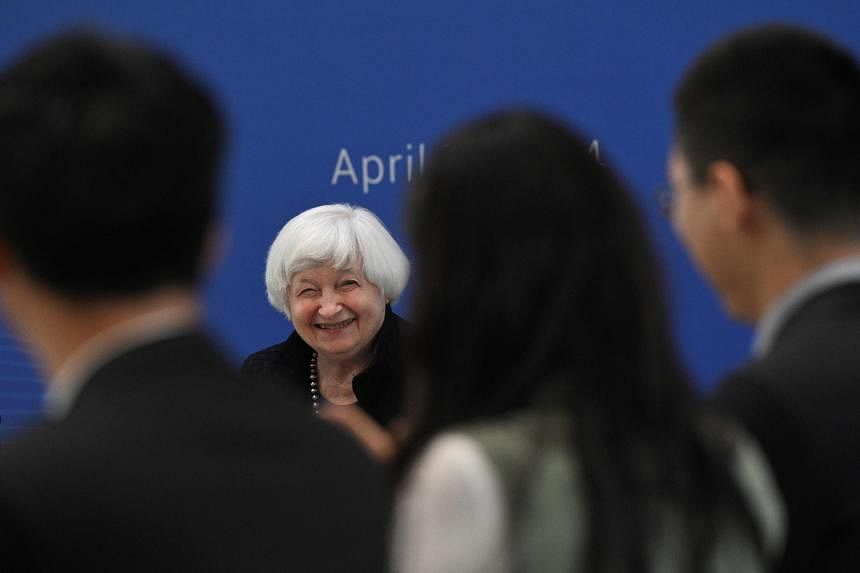BEIJING – US Treasury Secretary Janet Yellen warned China on April 8 that Washington will not accept new industries being decimated by Chinese imports as she wrapped up four days of meetings to press her case for Beijing to rein in excess industrial capacity.
Dr Yellen told a press conference that US President Joe Biden would not allow a repeat of the “China shock” of the early 2000s, when a flood of Chinese imports destroyed about two million American manufacturing jobs.
But she declined to threaten new tariffs or other trade actions should Beijing continue its massive state support for electric vehicles, batteries, solar panels and other green energy goods.
Dr Yellen used her second trip to China in nine months to complain that China’s overinvestment has built factory capacity far exceeding domestic demand, while fast-growing exports of these products threaten firms in the US and other countries.
She also drew parallels with the pain felt in the US steel sector in the past.
“We’ve seen this story before. Over a decade ago, massive PRC government support led to below-cost Chinese steel that flooded the global market and decimated industries across the world and in the United States,” she told reporters, using the abbreviation for the People’s Republic of China.
“I’ve made it clear that President Biden and I will not accept that reality again.”
When the global market is flooded with artificially cheap Chinese products, she said, “the viability of American and other foreign firms is put into question”.
She added that her exchanges with Chinese officials had advanced American interests and that US concerns over excess industrial capacity were shared by allies in Europe, Japan, Mexico, the Philippines and other emerging markets.
She said a newly created exchange forum to discuss the excess capacity issue intensively would seek to tackle it, but would need time to reach solutions.
She said a possible short-term solution was for China to bolster consumer demand and shift its growth model away from supply-side investment.
Dr Yellen spoke about the issue at length with Chinese Premier Li Qiang and also met Finance Minister Lan Foan on April 7. She met People’s Bank of China (PBOC) governor Pan Gongsheng and former vice-premier Liu He on April 8.
In a CNBC interview after the meetings, she said she was “not thinking so much” about trade restrictions on China as much as shifts in its macroeconomic environment. But she reiterated she will not rule out tariffs.
Treasury officials said the US and China are deepening cooperation on financial stability issues, with two more simulations of financial shocks scheduled after a recent exercise on dealing with the failure of a large bank.
The exercises have been developed by a US-China financial working group formed in 2023 when Dr Yellen first visited China to try to rebuild economic ties. Led by representatives of the US Treasury and the PBOC, it last met in Beijing in January 2024.
Pushback
China’s Parliament, the National People’s Congress, said in March that the government would take steps to curb industrial overcapacity.
But Beijing argues that the recent focus by the US and Europe on the risks to other economies from China’s excess capacity is misguided.
Chinese officials say the criticism understates innovation by their companies in key industries and overstates the importance of state support in driving their growth.
They also argue that tariffs or other trade curbs will deprive global consumers of green energy alternatives key to meeting global climate goals.
China’s Vice-Finance Minister Liao Min told Chinese media that Beijing “has fully responded” to US questions on overcapacity and expressed “grave concern” over restrictions Washington imposes on trade and investment.
Mr Liao said China’s “current competitive advantages are rooted in China’s large-scale market, complete industrial system and abundant human resources”, decrying the “escalation of green protectionist measures by some developed economies”.
“China will not sit idly and ignore it,” Mr Liao said in remarks published on the ministry’s website.
Mr Li also pushed back on Dr Yellen’s assertion, according to state news agency Xinhua, which quoted him as saying the US should “refrain from turning economic and trade issues into political or security issues” and view the issue of production capacity from a “market-oriented and global perspective”.
Chinese Commerce Minister Wang Wentao voiced more pointed objections during a round-table meeting with Chinese electric vehicle (EV) makers in Paris, saying that US and European assertions of Chinese excess EV capacity were groundless.
“China’s electric vehicle companies rely on continuous technological innovation, perfect production and supply chain system and full market competition for rapid development, not relying on subsidies to gain competitive advantage,” Mr Wang said during his trip to discuss a European Union anti-subsidy probe.
Dr Yellen also said she discussed the issue of TikTok “briefly” with Chinese counterparts, saying Washington had legitimate concerns when it comes to protecting sensitive personal data.
The US Congress is threatening to ban the wildly popular video app unless its ownership changes hands.
Dr Yellen noted that Beijing also shares worries over data protection, with many US social apps blocked in China.
“We would like to find a way forward,” she said. REUTERS, AFP

